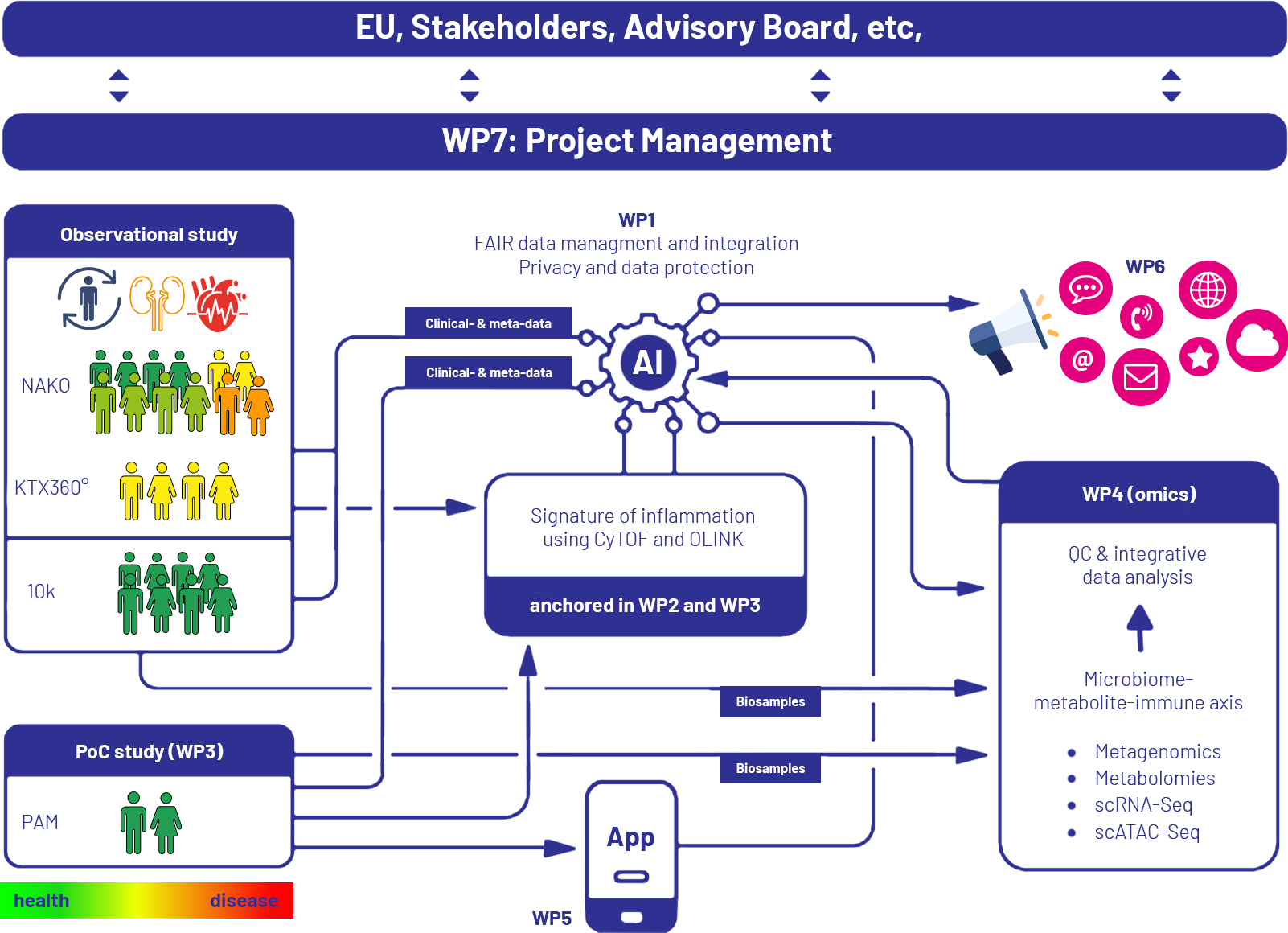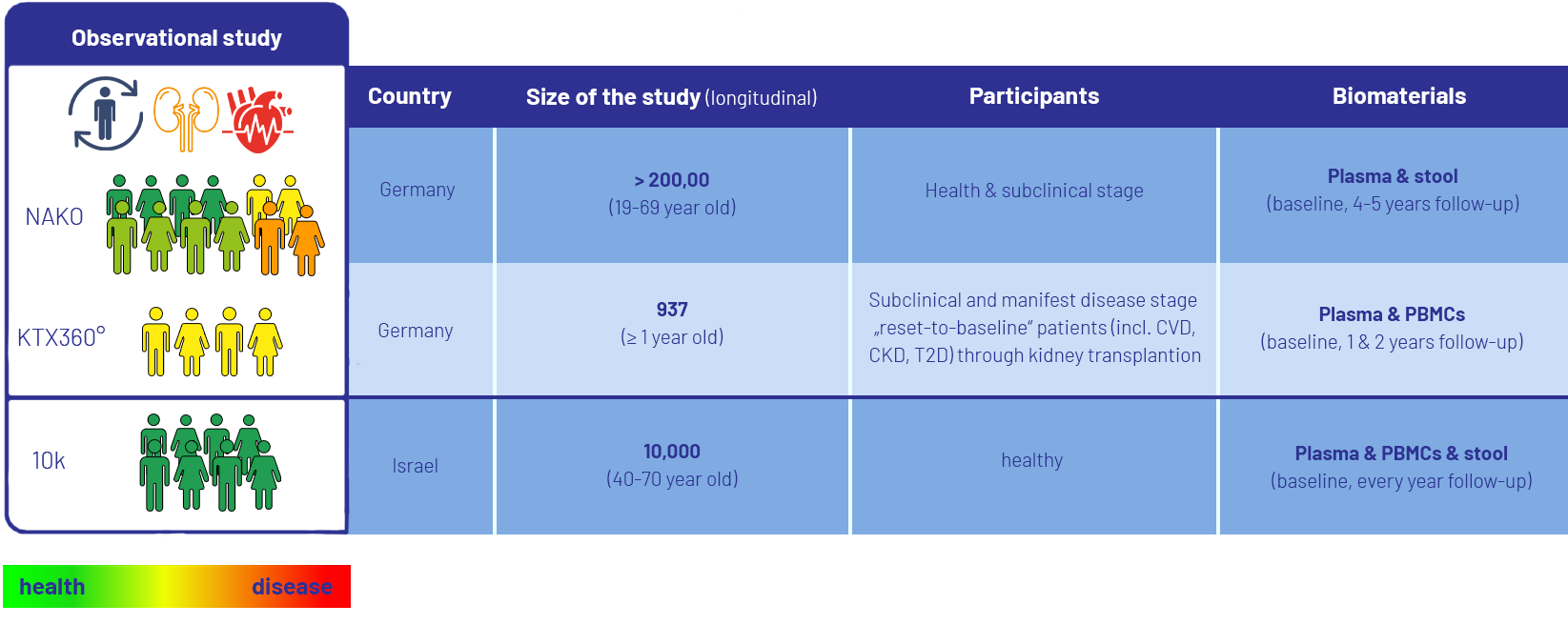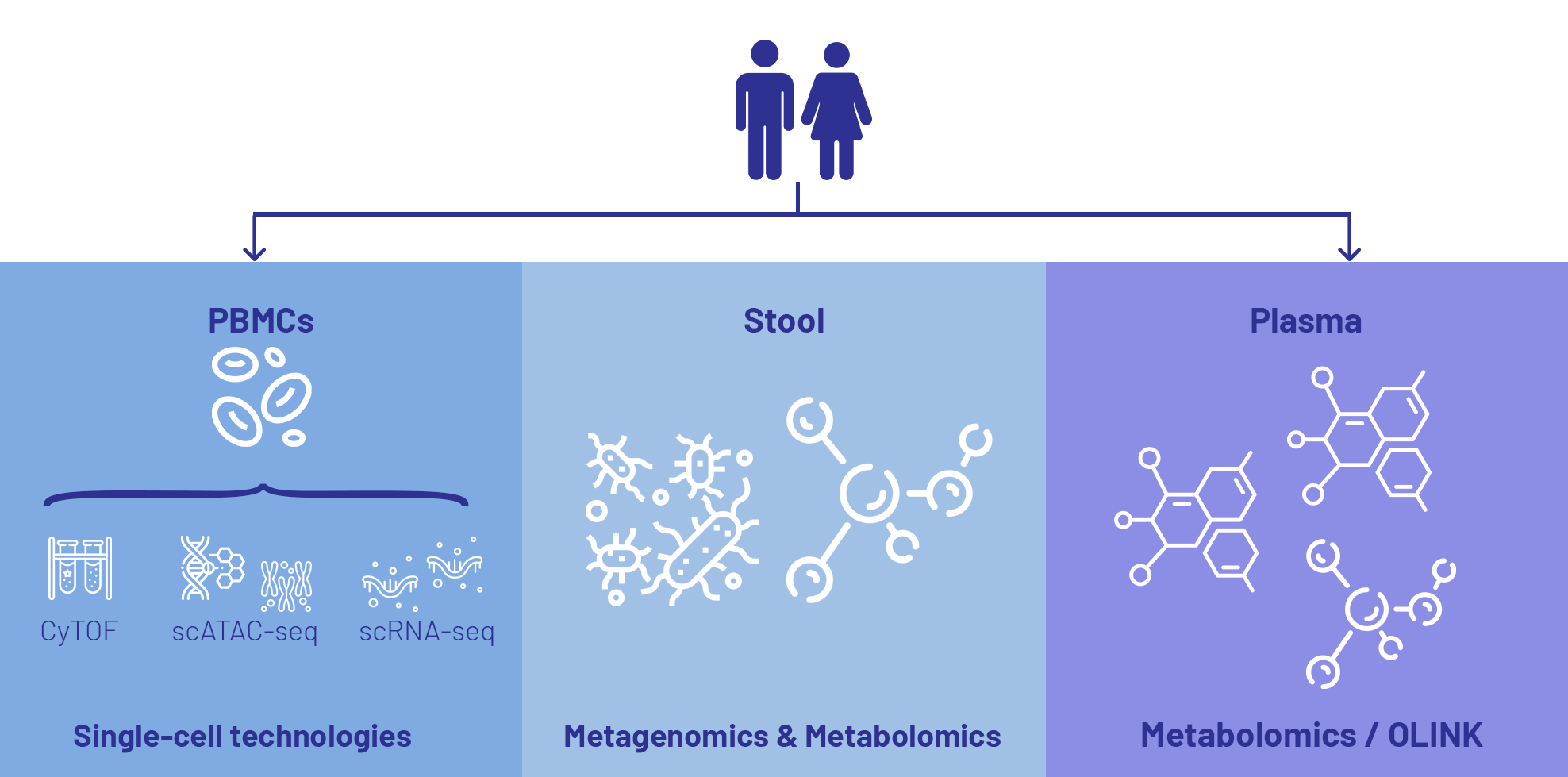Work Packages

Work Package 1 - FAIR Data management and integration for AI platform
WP1 will set up an internal communications strategy that is aligned between all WPs to safeguard that data is collected and stored in a structured way to minimize the risk of data loss and enable the share/reuse of data to increase efficiency during the project and verifiability and longevity of research data even after the project ends. WP1 will provide biomedical networks, as universal descriptors of systems of interacting elements from molecular interaction maps (i.e., immune cells, genes, microbiomes and metabolites) and (pre)-disease networks to healthcare systems and scientific knowledge. These networks will improve understanding of the immense complexity of a biomedical system.
The main objectives of WP1 are:
- Set-up of integration and representation of multiple layers of data
- Set-up of systems and software architectures
- Develop a chronic inflammation observatory
- Set-up of a reporting system for errors and risks of errors in data management
Work Package 2 - Unravelling shared and non-shared inflammatory signature of health to disease transition

WP2 aims at investigating shared and non-shared inflammation signatures in the transition from health to disease in the domains of metabolic, cardiovascular, kidney and brain function. To this end, existing data and biological samples from the prospective German National Cohort (NAKO, n=2,200) as well as a prospective cohort of kidney transplant recipients (KTX360°, n=937) will be used. Inflammatory profiles will be deeply characterized by OLINK® (plasma) and CyTOF (PBMCs).
The main objectives of WP2 are:
- To characterize an inflammation signature associated with metabolic function changes
- To characterize an inflammation signature associated with alteration of cardiovascular function
- To characterize an inflammation signature associated with alteration of kidney function
- To characterize an inflammation signature associated with progression of brain damage (subgroup in NAKO with available neuroimaging (brain MRI)
- To characterize shared and non-shared inflammation components in the transition from homeostasis to organ dysfunction
Work Package 3 - Proof-of-concept study to assess the benefit of the anti-inflammatory microbe
WP3 aims to test the efficacy of pasteurised Akkermansia muciniphila (PAM) in reducing mental and somatic symptoms of stress. To this end, a proof-of-concept study will be conducted with doctors, nurses, midwives and paramedics who are extremely vulnerable to stress and at high risk of occupational burnout, anxiety, depression and other psychosomatic disorders.
The main objectives of WP3 are:
- To assess the impact of the gut microbiota on the occurrence of somatic and mental symptoms of stress
- To establish host inflammatory markers/gut microbiota metabolites as candidate biomarkers for the occurrence and severity of somatic and mental symptoms of stress in healthy participants
- To establish the role of intestinal barrier integrity decline (and thus gut-brain axis (GBA) dysfunction) in somatic and mental symptoms of stress
- To test the efficacy of pasteurized Akkermansia muciniphila (PAM) administration in reducing somatic and mental symptoms of stress
- To link the effects of PAM administration on the immune system, microbiota composition and function, and metabolome in combination with clinical metadata by a multi-omics approach
Work Package 4 - A Multi-Omics Platform for Precision Immunology

WP4 will computationally combine the data collected in WP2 and WP3 with -omics data and link it to the AI platform of WP1 for the identification of systems-overarching modulation pathways of chronic inflammation potentially spanning microbiome, metabolome, immunome and phenome. The main objectives of WP4 are:
- to generate taxonomical and functional profiles of the gut microbiome of IMMEDIATE participants in relation to chronic inflammation
- to extract and sequence the faecal microbiome of IMMEDIATE participants
- to profile the plasma metabolome of IMMEDIATE participants in relation with chronic inflammation
- to perform single-cell RNAseq and ATAC-seq in PBMCs of the IMMEDIATE participants in relation to chronic inflammation
- to perform integrative analysis on systems-overarching modulation pathways of chronic inflammation across microbiome, metabolome, immunome and phenome
Work Package 5 - Apps development, implementation and deployment
WP5 will develop one or more Apps and APIs to support two-way communication between IMMEDIATE researchers and citizens including clinical study participants. The first app and the related API will be developed for the participants in the intervention study of WP3. By the end of the project, a further App will be developed for IMMEDIATE target groups as a tool to disseminate project results. The development of the different Apps/APIs will follow the participatory and iterative design approach.
The main objectives of WP5 are:
- the development and implementation of an App/API useful to researchers to gather information in the proof-of-concept study of WP3
- the development of an integrated digital system to disseminate the results of the project, consisting of a distance learning programme for health professionals and an app for citizens
Work Package 6 - Innovation Management: Communication, Dissemination, Exploitation
WP6 will follow a multidimensional, integrated and impact-oriented approach: It will ensure consistent communication and dissemination, assuring optimal visibility and wide outreach to relevant stakeholders. Strategic planning and implementation of project exploitation through dedicated innovation management will safeguard that high-quality results are captured, assessed and used. A proper IP management strategy will lay the foundation for further exploitation and sustainability activities taking into account the background knowledge of beneficiaries as well as newly created results.
The main objectives of WP6 are:
- To define, implement and evaluate the communication strategy of the project
- To define a tailor-made and effective dissemination and exploitation strategy, ensuring it is aligned with exploitation requirements and IPR procedures
- To engage key stakeholders and other networks
Work Package 7 - Project Management and Scientific Coordination
WP7 will provide a clear organizational framework, guidance and all support mechanisms to enable a smooth project workflow in IMMEDIATE and to ensure that objectives and milestones will be met in time.
The main objectives of WP7 are:
- Quick set-up of management & communication structures and processes
- Central monitoring of project activities, deliverables and deadlines to ensure the timely and qualitative achievement of project results through scientific coordination and impact-oriented project management
- To ensure efficiency, high quality and maximum usability of project outcomes
- Proper risk-analysis and conflict management